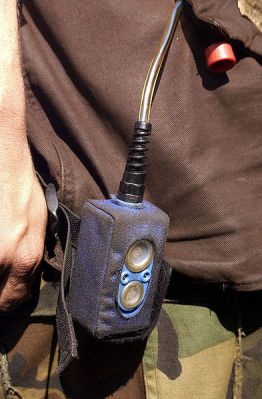The Combat Survivor Evader Locator is how stranded troops now call for rescue.
For those wearing U.S. military uniform, there are few things worse than falling off a warship, unless it’s becoming stranded behind enemy lines on a battlefield. Both are scary, potentially fatal events — and something the Pentagon is trying to fix. The Defense Department announced a pair of contracts Thursday aimed at helping to rescue such lost souls.
The Navy is buying what it calls “Man Overboard Indicators”— miniature radios, basically — that transmit a water-activated alarm when a sailor falls off a ship. The objective of the program “is to outfit each ship with a system capable of alerting the crew to a man-overboard event, so that a lifesaving rescue can be effected,” the service says. The latest $8 million contract to BriarTek Inc. is to support the systems while at sea.
“Statistics prove that when you fall from your ship, the most likely means of rescue is from the ship from which you fell,” BriarTek says. It describes its Man Overboard Identification and Location system (MOBI) as “an innovative system that allows for immediate, rapid recovery of a sailor or Marine.”
Not to be outdone, the Air Force is paying Boeing $7 million to support what it calls its Combat Survivor Evader Locator (CSEL). “The need for an improved Combat Search and Rescue (CSAR) capability grew out of deficiencies identified during operations in Southwest Asia and Bosnia when rescue missions experienced an extremely low recovery rate and often exposed the rescue forces to very high enemy threats,” Boeing says.
“When activated by the Isolated Person (IP), the CSEL handheld radio automatically and securely transmits their exact GPS location and identification information,” the company adds. “The IP and Rescue Centers are able to exchange messages on the IP’s physical condition, enemy location, rescue plans, and more. With this information, the rescue forces can plan and execute the mission while minimizing the danger to the IP and rescue personnel. CSEL makes `first pass’ rescues a reality.”
Both systems have been increasingly deployed with U.S. troops in recent years.


